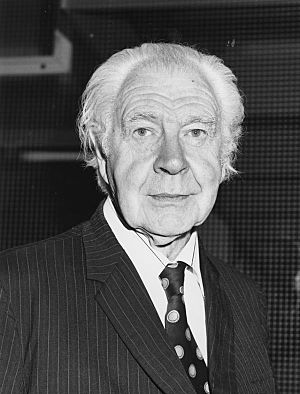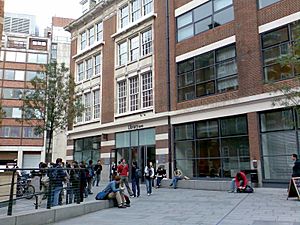Lionel Robbins facts for kids
Quick facts for kids
The Lord Robbins
|
|
|---|---|

Robbins at the opening of the Lionel Robbins building at the LSE, 27 July 1978
|
|
| Born | 22 November 1898 |
| Died | 15 May 1984 (aged 85) London, England
|
| Institution | London School of Economics |
| School or tradition |
Neoclassical economics |
| Alma mater | University College London, London School of Economics |
| Doctoral advisor |
Edwin Cannan |
| Doctoral students |
Nicholas Kaldor Amiya Kumar Dasgupta Abba P. Lerner William Baumol Frank Hahn |
| Influences | William Stanley Jevons, Philip Wicksteed, Ludwig von Mises, Nathan Isaacs |
| Contributions | Robbins Report |
Lionel Charles Robbins, Baron Robbins (born November 22, 1898 – died May 15, 1984) was a very important British economist. He was a leading figure in the economics department at the London School of Economics (LSE). He is well-known for his leadership at LSE. He also helped change how economics was studied in English-speaking countries. Robbins is famous for saying, "Humans want what they can't have." This idea is about how people always want more than there is available.
Contents
Early Life and Education
Lionel Robbins was born in Sipson, a village west of London. His father, Rowland Richard Robbins, was a farmer. His family were Strict Baptists. Lionel's sister, Caroline Robbins, later became a famous history professor.
Robbins was taught at home and then went to local schools. In 1915, he started studying at University College London. He wanted to help in World War I, so he joined the army in 1916. He served as an officer in the Royal Field Artillery. In 1918, he was hurt during a battle and sent home.
After the war, Robbins became interested in ideas about how society should be organized. He worked for a group that wanted the government to control the drink trade. In 1920, he went back to studying at the London School of Economics (LSE). He graduated in 1923 with top honors. His teachers thought he was the most promising student of his time.
Becoming an Academic
After finishing his studies, Robbins worked as a researcher for a short time. Then, he got a teaching job at New College, Oxford. He taught economics there for a year. In 1925, he returned to the LSE as a lecturer.
In 1927, Robbins went back to New College as a Fellow. But he still taught at LSE every week. In 1929, he became a Professor of Economics at LSE. During the 1930s, he helped build up the economics department. He hired other important economists like Friedrich von Hayek and John Hicks.

Economic Ideas and Debates
Robbins had different ideas from another famous economist, John Maynard Keynes. In 1930, they were on a committee together. Keynes wanted to introduce tariffs (taxes on imported goods) to help the economy during the Great Depression. Robbins disagreed strongly with this idea. He felt that Keynes's ideas were too protective of local industries. This disagreement caused some tension between economists at LSE and those at Cambridge University.
Even though he disagreed with Keynes at first, Robbins later accepted that sometimes the government needs to step in to help the economy. He wrote about his change of mind after World War II.
Defining Economics
Robbins is very famous for his definition of economics. He wrote it in his 1932 book, Essay on the Nature and Significance of Economic Science.
His definition is: "Economics is the science which studies human behaviour as a relationship between ends and scarce means which have alternative uses."
This means economics looks at how people make choices. It studies how we use limited resources (scarce means) to get the things we want (ends). These resources can be used in different ways (alternative uses). This definition became widely accepted by many economists.
Working for the Government
During World War II, Robbins joined the British government. He worked in the Central Economic Information Service. From 1941, he led the Economic Section. He helped create a successful system for rationing clothes and household goods. This system made sure everyone got a fair share during the war.
Robbins also helped plan for the world after the war. He represented the United Kingdom at important meetings. These included the 1943 conference in Hot Springs, Virginia, about food security. He also attended the Bretton Woods Conference in 1944. This conference helped set up the rules for international money and trade after the war. During this time, he became good friends with John Maynard Keynes.
Later Life and Higher Education
In 1963, Robbins led a committee that produced the Robbins Report. This report suggested that higher education (like universities) in the United Kingdom should grow a lot. The idea was that if qualified people wanted to go to university, there should be enough places for them. This idea is sometimes called the "Robbins principle."
Robbins became the first leader (Chancellor) of the new University of Stirling in 1968. He also believed that the government should give a lot of support to the arts and universities.
Later in his life, Robbins studied the history of economic thought. He published books about how economic ideas developed in England.
Honours and Recognition
Lionel Robbins received many honours for his work. In 1959, he was made a life peer. This meant he became Baron Robbins and could sit in the House of Lords. In 1968, he was appointed a Companion of Honour.
The Lionel Robbins Building at the London School of Economics is named after him. There is also a Lionel Robbins Building at Nottingham Trent University.
Family Life
In 1924, Lionel Robbins married Iris Elizabeth Harris Gardiner. They had a daughter named Ann and a son named Richard. His son Richard became an artist and sculptor. There is a sculpture of Lionel Robbins made by his son at the LSE.
See also
 In Spanish: Lionel Robbins para niños
In Spanish: Lionel Robbins para niños
- Welfare definition of economics
Images for kids



